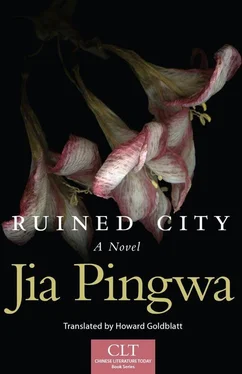Zhuang sympathized with the man. He could not agree more.
“That’s a great idea,” Huang blurted out. “My wife wins every fight. If I slap her once, she answers with two. As a man I have to let her have her way. Besides, she won’t back down if I don’t hit her hard enough, and I’m afraid I’d hurt her if I hit her too hard. I’m going to buy one of these.” He got up, walked over, and put on the gloves. He tried a few tentative punches. The woman had stood up to leave when the director was talking to his visitors about boxing.
“Don’t go yet. There’s more we need to talk about.”
“I’ll go to the toilet,” she said. “Where is it?”
“There’s no toilet on this block, but if you go out the back door, you will find one to the left of Shangli Road. Just follow the flies.”
She smiled at Zhuang and the others as she walked out, but came back for her purse.
“There are bricks by the back door. Take a couple to stand on out of the dirty water.”
The moment she was out of sight, Hong whispered to Zhuang, “She looks like a woman of means.”
“I’m not so sure,” Zhuang said. “The purse looks expensive, but all she had in it were tissues.”
“A pretty woman like her shouldn’t have trouble finding a rich husband,” Hong said.
“She is pretty, isn’t she?” Director Wang said. “The best-looking worker at the candle factory. Just look at her face with its rosy glow, like a peeled egg soaked in rouge.”
“She doesn’t look like a factory worker. What are you working on?” Zhuang asked.
“Writers have eagle eyes,” he said. “She majored in architectural design at a vocational school, but then couldn’t get a job assignment upon graduation. How could she, when architectural graduates from regular colleges at the provincial and city levels can’t find them? So she was sent to the candle factory. Now forty-eight streets in the city do not have public toilets. At the People’s Congress, the mayor discussed projects that would benefit the residents, and toilet construction was one of them. I gave her the job of designing a toilet for this block.” Wang turned to Zhuang. “I haven’t seen you for ages. What has our celebrated writer been working on? When will you write something about us?”
“No problem. I’ll come for a tour whenever you want, but I’m here today to ask a favor.” Zhuang told him about Song’s situation, and asked Wang to talk to his cousin.
“How can I say no to someone like you? Now that we’ve met, Dr. Song, you can come back some other day to describe your situation. I’ll take you to see my cousin.”
Song nodded over and over, like a chicken pecking at rice. The woman returned and stopped at the door, where she stomped her feet loudly.
“I told you to take bricks,” Wang said. “Why didn’t you?”
“I did, but there was a long line, and they got too heavy, so I threw them away. Luckily I’m wearing high heels. If not, my feet would be soaked.”
“The line shouldn’t be long now. The longest lines are in the evening after the TV shows or in the morning when people first get up. Many husbands line up for their wives and vice versa, giving the impression that these are unisex toilets. What’s funny is, sometimes passersby think the people are lining up to buy something that’s about to go up in price, and they’ll line up, too.”
That got a laugh from everyone.
“You have a back door,” the woman said, “but other people have to take the long way around. A single visit to the toilet made me realize how important my task is, Mr. Wang. But we need to talk about the location. I looked around. There’s a restaurant to the north, so the toilet can’t be built there. To the south is a shop, next to a public faucet, and a toilet can’t be placed by a source of drinking water. The only workable site would be somewhere in the middle of the lane, but there’s a barbershop there whose owner protested that his family depends on it for their livelihood. He would fight anyone to the death who dared try to take the site away from him.”
“How many lives does he have to give?” Wang said, and the woman fell silent.
“You don’t sound like a local,” Zhuang said, finding her student-like demeanor captivating.
“I’m originally from Anhui,” she replied.
“Ah-lan, meet an old friend, Zhuang Zhidie, a writer.”
She uttered a cry, but quickly blushed at her inappropriate reaction. “No wonder I thought you looked familiar when you walked in, but I couldn’t recall where I’d met you. Thanks to Mr. Wang, now I remember, I’ve seen you on TV.”
Zhuang smiled. “So you’re from Anhui. Where in Anhui?”
“Suzhou. Have you ever been there, Zhuang Laoshi?”
“No, but it reminds me of someone. I wonder if you know her. A college student back in the 1950s, labeled a Rightist, a talented, pretty woman. I only know that she’s widowed and that she lives in Suzhou. I don’t know where she works.”
“Are you talking about the girl who was close to Mr. Zhong years ago?” Hong Jiang asked.
“You know about that, too?”
“Zhou Min told me about the quirky old man. How can he be so lovesick at his age? He keeps writing to her but gets no response, typical unrequited love.”
“You don’t know what’s going on, so don’t speak ill of him.” Zhuang turned to the woman. “Do you know her? Do you know anything about her?”
She considered his question and then shook her head softly.
“When did you leave Suzhou?”
“Seven or eight years ago.”
“Do you still have family there?”
“I have two sisters. One is here in Xijing with me, but our older sister works in Suzhou’s postal and telecommunication office. I can ask her to track down the woman.”
“No need. She might not be in Suzhou at all. She could be dead, for that matter. I have a different favor to ask, if you’re willing to help.”
“What is it?” Ah-lan asked. “I’d be honored to do something for you.”
Zhuang handed her one of his cards. She said she had no card to give him. There was a phone at the factory, but the workers were not allowed to use it, so he could only contact her by calling her sister’s house. She added that she had been staying with her sister while her dormitory was being relocated. She wrote down her sister’s address, name, and phone number. Zhuang thanked her and added, “I’ll look you up when the time comes.”
Growing impatient at the prolonged conversation between Zhuang and the woman, Wang hit the punching bag, a signal that was not missed by Zhuang, who said to Song, “That’s that, then. Mr. Wang is willing to help, so you can come back someday to go see the chief with him. Mr. Wang has a lot to do today, so we should be leaving.”
They stood up.
“Leaving so soon? Well, then, come back any time you’re free. If you ever need a fourth for a round of mahjong, give me a call and I’ll be there.”
As they walked to the door, Ah-lan took out a diary for Zhuang’s autograph.
“What’s the point?” he asked, but he signed anyway, so elating the woman that she missed a step as she was walking them out.
“Have you twisted your ankle?” one of them asked.
She hadn’t, but one of her heels had broken off, and she was red from embarrassment.
“Look at you,” Wang said. “Just look at you. What were you doing?”
“This is so embarrassing,” she said. “These are new shoes, so how could the heel break off so easily?” She stood up and hobbled along on the uneven heels. Wang offered to buy a new pair for her at the store at the intersection, but she declined.
“No, I can’t let you do that. It’s no big deal. My brother-in-law can repair shoes.” She picked up a brick to knock the heel off the other shoe and put both heels in her purse, before looking red-faced at Zhuang and his friends. “So long.”
Читать дальше


![Matthew Vincent - [you] Ruined It for Everyone!](/books/216429/matthew-vincent-you-ruined-it-for-everyone-thumb.webp)









